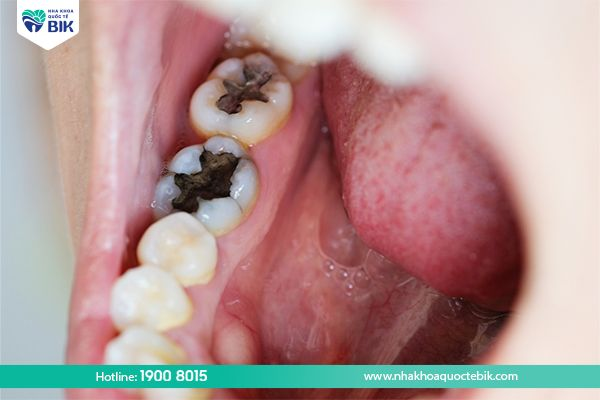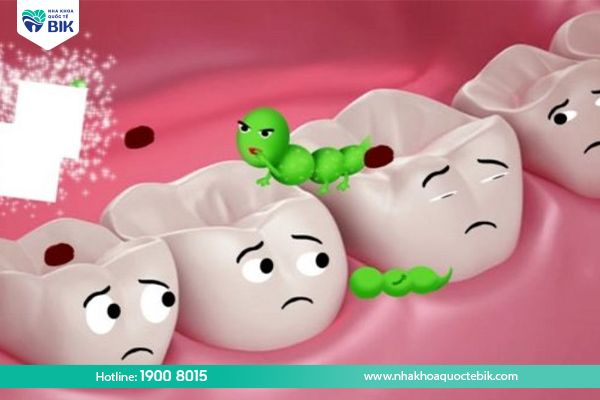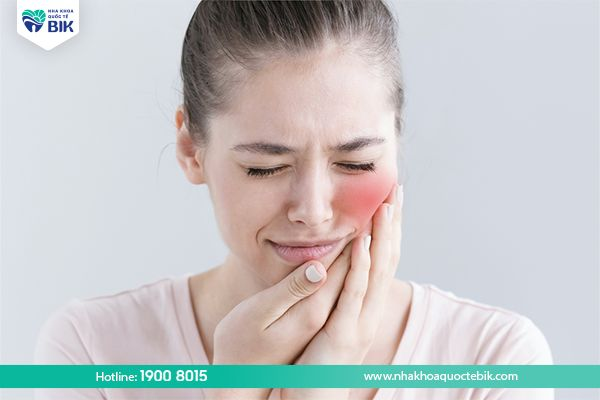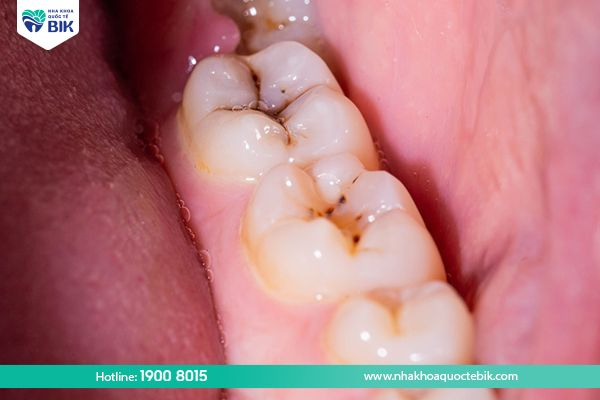Tooth decay is the most common oral disease today and can appear at any age from children to the elderly. If tooth decay is not prevented in time, it will cause prolonged pain that greatly affects daily life. So let’s find out with BIK International Dentistry whether tooth decay is hereditary or not, and whether it can be transmitted from one person to another!
1. Things to know about tooth decay
Tooth decay is a disease that causes damage to the hard tissue of the tooth when the process of mineral destruction occurs. S. Mutans bacteria is the cause of the disease when they act on carbohydrate enamel to create acid that corrodes tooth enamel and forms cavities.
In particular, this harmful bacteria easily reproduces and develops in an environment containing a lot of sugar and when the patient does not clean their teeth properly or regularly uses stimulants or tobacco.
Tooth decay is a disease that can occur at any age, but is most common in children, adolescents and the elderly. The possibility of tooth decay will be very high if the patient does not comply with proper oral hygiene. If not treated promptly, the decay can progress and cause effects on the tooth structure, causing pain, gum infection and even permanent tooth loss.
The best way to prevent and treat tooth decay is to have regular check-ups, proper oral hygiene and use dental floss.

2. Is tooth decay contagious?
Can tooth decay be transmitted from person to person is a question that many people are interested in. As mentioned above, tooth decay is a common dental disease, caused by the bacteria S. Mutans. This is a type of bacteria that can spread from one tooth to another in the oral cavity. Therefore, if tooth decay is not treated promptly, it can affect healthy teeth next to it. However, the transmission of tooth decay from person to person is very rare and is not the main cause of the disease.
If tooth decay is in the early stages, the possibility of infection is very low. Only when the concentration of bacteria in the oral cavity increases too high when tooth decay has progressed severely, can the disease spread through saliva. Direct contact with the saliva of a person with tooth decay can cause the risk of infection.
However, in some cases, tooth decay can spread between family members if they share a toothbrush or drink from the same water bottle. However, only direct contact with the mouth and saliva of an infected person can cause a high risk of tooth decay.
Therefore, proper oral care and not sharing personal items are the best ways to avoid the spread of tooth decay in the family.

3. Is tooth decay hereditary?
According to recent dental research, tooth decay can be influenced by genetic factors. If parents have tooth decay, their children are more likely to have the disease due to inherited weak tooth enamel. Other factors such as dental structure are genetic and can weaken teeth, reducing their ability to fight bacteria. Genetic factors include: Minor enamel, poor tooth morphology, deficiency or excess in the depth of the grooves and the amount of saliva.
These subjects are at risk of forming plaque faster than normal people, leading to a high risk of tooth decay, gingivitis or periodontitis. Well-calcified enamel is a factor that supports high anti-cavity activity, while uncalcified enamel has a lower ability to fight tooth decay.
In addition, poor tooth morphology and enamel convexity also limit self-cleaning ability and create opportunities for bacteria to attack. Genetics also affect the depth of the grooves on the teeth and can thereby affect the ability to fight bacteria.
The grooves and fissures on the teeth create a favorable environment for food residue to remain, thereby forming bacterial nests. Cleaning teeth in these grooves will be more difficult and will gradually lead to tooth decay. In addition, the viscosity and quantity of saliva can also affect tooth decay. In people with less saliva than normal, such as after cancer treatment or diabetes, the risk of tooth decay is higher than normal people.

4. Can tooth decay be transmitted through kissing?
“Can tooth decay be transmitted through kissing?” is a concern of many people. In fact, tooth decay bacteria can be transmitted from one person to another through direct or indirect contact with teeth and saliva. If a person has tooth decay, during kissing, tooth decay bacteria can spread through saliva to the person opposite.
According to Dr. Layliev – a dental expert at the New York Cosmetic Dentistry Center (USA), kissing is a direct way for tooth decay bacteria to attack the teeth of healthy people. If there is tongue contact in kisses, the risk of infection increases. In addition, tooth decay can also be transmitted through oral contact and saliva exchange.

5. Effective ways to prevent tooth decay
To effectively prevent tooth decay, you should note the following:
5.1. Proper oral hygiene
– Maintain the habit of brushing your teeth at least twice a day, especially after eating to completely remove food plaque on the tooth surface. Avoid tartar buildup, creating conditions for bacteria to grow and cause tooth decay.
– You should change your toothbrush at least every 3-4 months to avoid bacteria accumulating and causing tooth decay.
– Use toothpaste containing Flour to help teeth stay strong.
– Combine the use of dental floss or a water flosser to completely remove food debris deep in between teeth, where the toothbrush cannot clean.
– Visit the dentist to remove tartar periodically at least every 6 months. Regular check-ups will also help the doctor detect any oral diseases and promptly treat them.

5.2. Reasonable diet
– Limit snacking, especially sweet foods, foods high in sugar such as cakes, candies or carbonated drinks because they will stimulate bacteria to attack tooth enamel.
– Supplement enough vitamins and calcium to increase resistance against harmful bacteria.
– Limit the use of foods that are too hard or easily stuck between teeth.
– Limit eating foods high in starch because they are easily converted into tartar in the oral environment if not completely cleaned.
– Use xylitol chewing gum combined with Fluoride to minimize the risk of tooth decay.

So through the above article, hopefully you have known whether tooth decay is hereditary and can be contagious. Genetic factors such as: Minority of tooth enamel, poor tooth morphology, deficiency or excess in the depth of the tooth groove and the amount of saliva can be the cause of tooth decay. To avoid dangerous complications, patients should go to dental facilities for proper examination. In particular, BIK International Dental Clinic is a dental facility specializing in treating tooth decay with a team of reputable and experienced doctors.


















